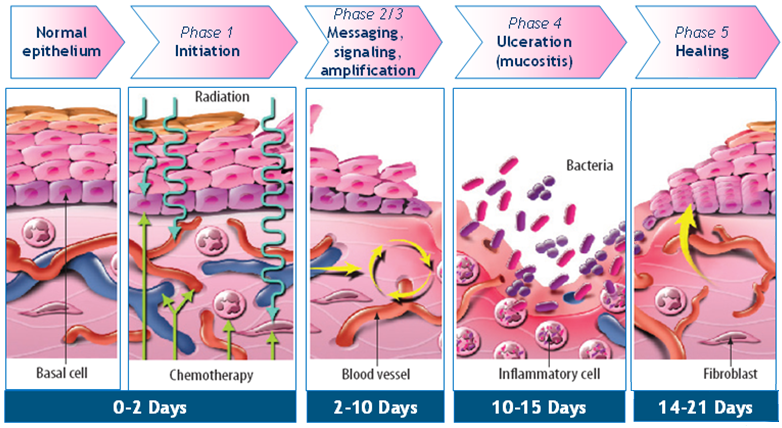Is the oral care of cancer patients being neglected?
A comprehensive update on the pharmacology of Oral Mucositis

Some 40% of patients receiving cytotoxic chemotherapy will develop mucositis during the course of their treatment. The pharmacological basis of this mucositis is complex, involving sequential interaction of chemotherapy drugs and/or irradiation, on mitosis of proliferating epithelium, release of a number of cytokines, as well as on elements of the oral microbial environment.
Various interventions based on biological attenuation have been tested for mucositis. Such interventions have been extensively reviewed ; however, most reviews focus on biomedical outcomes. Little attention has been paid to mucositis outcomes such as oral morbidity or the psychosocial aspects.
The published data suggests that chemotherapy and radiotherapy regimens are the most significant determinants of mucositis. In particular, high-dose methotrexate, etoposide and melphalan, as well as hyperfractionation irradiation will cause most serious forms of mucositis.[6,21]
Studies investigating agents to ameliorate mucosal toxicity should therefore be stratified according to the regimen of cancer therapy.[6,22]
Now we must consider the potential toxicity of “small molecule” tyrosine kinase inhbitors and newer agents.
Nevertheless, mucosal response to chemotherapy and radiotherapy tends to be unpredictable.
Dosages that produced severe oral reactions in some patients may cause little or no affect to others receiving the same regimen.
While a large scale multivariate study is lacking, the literature suggests that the collective risk of mucositis in cancer patients relates to several precipitating factors including age, oral hygiene, nutritional status, and xerostomia.
Pharmacology of Oral Mucositis Powerpoint presentation by David Houghton
Download full Powerpoint presentation.
Feedback from UKOMiC Conference Delegates
Improved understanding.
Very clear and has made me very excited about UKOMiC guidance.
Some very valid and useful points.
Thank you very much, it was worth it!
